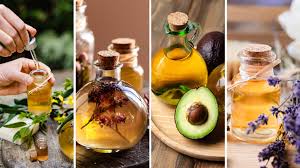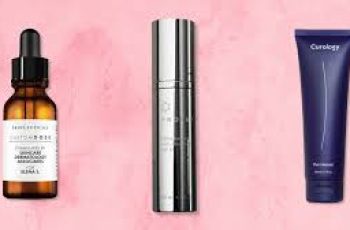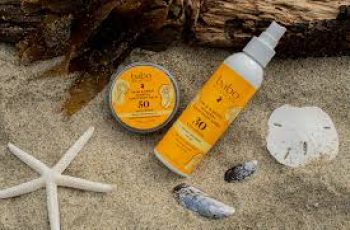Which Oil is Best for Your Hair?
We’re all searching for a product that will make our hair look shiny, bouncy, and healthy, and not too long ago, the only way to achieve that was to go to the hairdresser. Luckily for us, hair oil has become a big thing, as many haircare brands are searching for the most nourishing and effective formulas to give us shiny hair worthy of a Disney princess. There’s only one question left: which oil is best for your hair? We’re looking at just that today.
Is Oil Good for Your Hair?
It really all depends on your hair type and its condition. By applying hair oil, you’ll help nourish and restore strands, as well as give them a natural shine. Those with curly, coarse, and drier hair will notice a real difference in manageability and appearance.
Curly Hair – This hairstyle can sometimes be a little too drying. Applying hair oil to curly hair can hydrate the curls, making them smoother and making them much easier to tame and style.
Fine Hair – Fine hair can really benefit from using hair oil. Apply oil to the mid-lengths and ends of your hair, avoiding the roots, as the product can weigh down strands and make them look greasy.
Dry Hair – It goes without saying that dry hair loves oils to volumize, smooth and moisturize your hair and restore its health.
Oily Hair – Applying oil to oily hair may sound counterproductive, but applying product to the ends of your hair will encourage hair growth and prevent breakage.
As you can see, many hair types will find that essential oils can regrow their curls, making them more manageable, stronger and more beautiful.
What happens if we don’t oil our hair?
Hair produces a natural oil that is the same sebum found in our skin. It works to condition the hair and keep your hair and scalp healthy while preventing dandruff and hair loss. To support sebum production, it’s best to comb your hair regularly, which transfers oil from your scalp into your hair strands. This distribution of sebum is good for your hair, but it’s always a good idea to add extra products to your routine for a number of reasons.
Applying oils can regulate your hair’s sebum production and prevent your scalp from becoming dry and itchy.
By massaging the oil into your scalp, you will also notice that hair growth improves and your hair becomes moisturized, thicker, and shinier.
Dandruff issues can also be prevented by massaging hair oil into your scalp to stimulate blood circulation and keep your hair healthy.
These are some of the hair care benefits you can expect when you use the different oils available in the market. You will also notice that your hair falls out less and issues like split ends are significantly less noticeable.
Which oil is best for my hair?
Here are some of the key oils in the most popular hair care product formulas. They can be used as an additional ingredient or in their original form.
Coconut Oil
The benefits of coconut oil for hair care are numerous: it boosts scalp health, stimulates hair growth, and even protects your hair from heat damage caused by regular styling.
Suitable for: All hair types, especially dry, damaged, and dull hair.
Argan Oil
Also known as the liquid gold of Morocco, Argan oil is the first oil to create a national obsession. This ingenious oil protects hair from UV rays and heat damage. It straightens hair, making it easier to style and feeling super soft.
Best for: Dry, brittle, frizzy hair that is often exposed to heat. If you have oily roots and dry ends, this oil is best for you.
Jojoba Oil
Jojoba oil is very moisturizing and nourishes the hair from the roots to the ends. It also prevents dandruff and dry, itchy scalp.
Great for dry, damaged, and dull hair that may have issues with dandruff and itchy scalp.
You will find most of these oils in hair care products as they have several hair regenerating properties. Other oils used include olive oil, sweet almond oil, lavender oil, and grapeseed oil, all of which produce similar effects and make hair look thick, nourished, and shiny.
Should I oil my hair every day?
While oils are good for hair, using too much can actually damage it. The ideal amount is to apply oil once or twice a week as this helps to maintain a balance between the scalp and hair. Applying hair oil to the scalp tissue every day can cause dirt and bacteria to accumulate and interfere with the hair’s natural oil production, which in turn can lead to increased hair loss. Using hair oil regularly can make your hair look and feel great.
How long should I leave oil in my hair?
This is completely up to you and your schedule. With a very nourishing oil like jojoba, you can leave the product in your hair for about 10 to 20 minutes. It instantly moisturizes curls and tames stray hairs. You can also leave the oil in your hair overnight. It’s great for rough, dry, and damaged hair because it regrows strands, smoothes follicles, and gives hair a natural shine. Just be sure to protect your pillowcase from residue!
Now you know a little more about which oil is best for your hair type and the damage caused by daily styling. You’ll have commercial-grade, gorgeous hair in no time!
DQH Knowledge drop: In your 20s, your skin cell turnover decreases. (Cell turnover is a key component in keeping your skin youthful.) You know what else slows down? Your collagen production. Starting in your 20s, collagen decreases by about 1 percent per year. Should you want to prevent fine lines and wrinkles, start by eliminating behaviors that contribute to premature aging. “If it’s bad for you, it’s bad for your skin,” says dermatologist Michel Somenek.
“Cigarette smoking reduces blood flow to the skin and causes premature wrinkling and a dull skin texture. Making the repeated pursed motion to inhale can also cause smoker’s lines. Alcohol and recreational drugs are toxins for the skin that damage its cellular structure and DNA,” Somenek tells us. “The faster you eliminate vices while you are young, the better chance your skin and body have to recuperate.” Also, adopting an anti-aging routine in your 20s is key. After all, the best offense is a good defense. We spoke to Somenek and experts Joshua Ross and Audrey Kunin to find out more.
Keep reading for the best anti-aging products for your 20s, according to skincare professionals.
Sunscreen
“We all know that the sun is the number one cause of skin aging and starting the prevention in your 20s is very important,” Ross says. “The majority of your sun damage won’t start to appear until you’re in your 30s, so don’t wait until you see it surface or you’ll be behind the curve. Stay ahead of it with a good-quality zinc-based sunscreen worn daily.”
Farmacy Green Defense Daily Mineral Sunscreen
An invisible sunscreen with SPF 30, plus botanical extracts meant to protect skin with tons of antioxidants. Bonus: It’s clean and fine to use under makeup.
Bareminerals Complexion Rescue™ Tinted Moisturizer Broad Spectrum SPF 30
Although we recommend you use your SPF and moisturizer separately, we also understand moments when you don’t have time or energy for that extra step. For those times, this bareMinerals moisturizer is a great thing to have on hand.
Vitamin C Serum
“A great introduction to anti-aging is to start with a vitamin C serum in your morning skincare routine,” Ross says. “It’s a powerful antioxidant that will neutralize free radicals and brighten the skin.” He adds that it’s a great way to counteract the effects of the sun’s harmful rays, which, as previously mentioned, are among the biggest causes of premature aging.
Drunk Elephant C-Firma™ Vitamin C Day Serum
The Drunk Elephant C-Firma is a lightweight serum that promises to give skin a glow by combining the brightening powers of vitamin C with ferulic acid, l-ascorbic acid, and vitamin E. The included sodium hyaluronate is meant to replace hydration loss, so you shouldn’t have to deal with any irritation.
Sunday Riley C.E.O. Rapid Flash Brightening Serum
This potent serum is jam-packed with vitamin C (15 percent, to be exact), which means it’s a potential superstar at both brightening skin and dousing it in antioxidants.
Peptides
Using peptides on your skin has many benefits, says Somenek. “The skin barrier is what defends the body against pollution, UV rays, bacteria, and toxins. It can be damaged by several everyday factors. Using topical peptides aids in building a stronger barrier,” he says. “Peptides comprise elastic fibers, which are a type of protein. These fibers help to make skin appear taut and firm. Peptides can also help repair damaged skin, relieve inflammation, and even out skin tone. Some peptides can kill acne-causing bacteria that is common in 20-somethings.”
Kunin agrees, saying, “Peptides are an excellent entry point for supporting collagen.” She recommends looking for face and eye treatments that contain these collagen-boosting powerhouses.
Charlotte Tilbury Magic Eye Rescue Cream
This Charlotte Tilbury super-emollient eye cream has a base of coconut oil and shea butter (read: it’s incredibly hydrating). Botanicals plus peptides are meant to help reduce dark circles and boost collagen, respectively.
This creamy moisturizer serves up potent collagen-boosting peptides and pycnogenol, and antioxidant-rich vitamin C. “Instead of sitting on top of the skin, peptides penetrate the outer layer so they go deep. The ‘signals’ they send tell the cells to produce elastin and collagen, which are needed for youthful-looking skin,” explains Somenek.
At-Home Peel Pads
Remember that skin cell turnover fiasco we talked about earlier? One way to help support it is by exfoliating. “Exfoliation is important to help keep skin fresh and luminous,” Kunin says. She recommends using at-home peel pads as an easy and effective way to exfoliate.
“The goal in your 20s is to fight the slowing pace of cell turnover. It is wise to use products that gently exfoliate, yet still remove oil and other impurities. Products that have Alpha Hydroxy Acids (AHA) or Beta Hydroxy Acids (BHA) are a good choice.”
According to Somenek, you should only exfoliate two to three times a week. “People of all ages are guilty of over-exfoliating and that can be too much of a good thing,” he says.
Dermadoctor Kakadu C Intensive Vitamin C Peel Pad
A few swipes of this Derma Doctor powerful peel pad promise to leave your skin glowing and smooth, thanks to the seven (yes, seven) types of chemical exfoliants, including AHA and BHA. It also contains vitamin C via Kakadu plum extract for added brightening and antioxidant protection.
KEY INGREDIENTS Kakadu plum extract is sourced from the Kakadu plum, a fruit grown in northern Australia. It contains vitamin C, which restores the skin’s natural barrier, increases collagen production, and soothes irritation.
Dr. Dennis Gross Skincare Alpha Beta® Universal Daily Peel Pads
These are the gold standard of peel pads, with a cult following and over 900 five-star reviews on Sephora. They’re easy to use and contain a blend of anti-aging exfoliating acids.
Emollient Night Cream
“In your 20s, you need to start upping the hydration in your skincare routine. You may have been cautious of over-moisturizing because of acne in your teens, but as you enter your 20s, your skin transitions and becomes drier,” Ross says. “I recommend an emollient night cream added into your evening skincare regimen.”
“Twenty-somethings need to make sure that they are not using creams that will clog their pores and cause excess oil production,” says Somenek. Opt for non-comedogenic products.
Cerave Skin Renewing Night Cream
One great choice is the CeraVe Skin Renewing Night Cream, which is a non-comedogenic night cream that leaves skin soft and glowy. It combines the moisturizing powers of ceramides and hyaluronic acid.
RoC Retinol Correxion Max Hydration Creme
“The best night cream ingredients contain retinol, benzoyl peroxide, and/or salicylic acid or hyaluronic acid. The goal is to moisturize, yet remove excess oil,” says Somenek. This Roc Retinol Correxion cream fits the bill as it contains both hyaluronic acid and retinol so it promises to moisturize while also being non-comedogenic.



